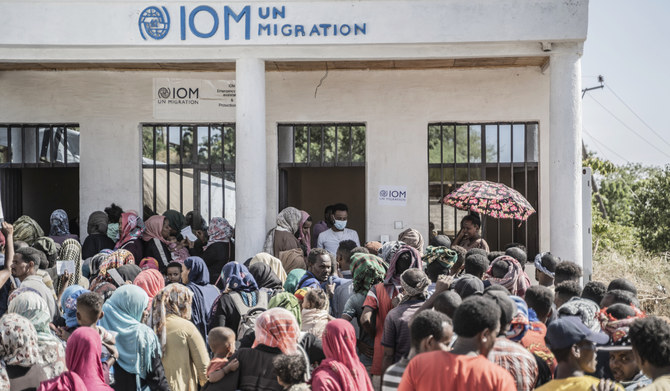Hafed Al-Ghwell
The EU has long been grappling with the issue of irregular migration across the Mediterranean. Each year, thousands of people embark on perilous journeys in an attempt to reach Europe, often fleeing conflict, poverty and persecution in their home countries — contrary to stereotypical, dismissive assessments of them being opportunistic economic migrants. Unfortunately, many journeys end in tragedy, with countless lives lost at sea.
Despite the EU’s “best” efforts to address this crisis, its current approach, which focuses on the security dimension rather than humane, pre-emptive interventions, adds to claims by critics that Europe has adopted a policy of “strategic negligence” — a deliberate or inadvertent failure to address a critical issue, resulting in negative consequences. Not only have interceptions at sea become more deadly, rescue operations for distressed or capsized boats are delayed, which leads to more tragedy.
A prime example of this is the EU’s obsessive, short-term focus on border control and deterrence measures. In 2020, the EU allocated €23.8 billion to its border management agency, Frontex, for the period of 2021-27, a significant increase from just €6.4 billion in the previous period. While border control is an important aspect of migration management, this overemphasis on security has come at the expense of not addressing the root causes of irregular migration, such as conflict, poverty and lack of economic opportunities in countries of origin.
Calls to prioritize tackling those root causes consistently fall on deaf ears, which only exacerbates the very risks Europe is seeking to avoid, such as increased instability, worsening social tensions and the growth of criminal networks involved in human smuggling. A very security-oriented approach has clearly not worked. If anything, it only tries to alleviate the symptoms by inadvertently fueling additional troubles.
Another example is the EU’s cooperation with third countries, such as Libya and Tunisia, to build a virtual wall to deter boats leaving North African shores. This “cooperation” typically comes in the form of financial and technical assistance to assist the Libyan Coast Guard intercept and return migrants attempting to cross the Mediterranean. However, this approach has been heavily criticized for trapping migrants in a cycle of violence and abuse in Libyan detention centers, where they face inhumane conditions, torture, and even death.
This not only violates the principle of non-refoulement, which prohibits the return of individuals to countries where they may face persecution. It also perpetuates the same conditions and desperation that drives migration in the first place. Besides, it also undermines the EU’s professed commitment to human rights and humanitarian principles.
The EU’s glaringly flawed policies have created an awful tragedy that endangers both migrants and their host communities. To drum up support for exclusionary, knee-jerk responses, governments have helped to fuel a rise in far-right, anti-immigrant sentiments in Europe, or at least kept it mainstream by framing migration as a security threat. This inadvertently fuels xenophobia and racism, which are easily exploited by far-right parties to gain political power, polarizing European societies and undermining social cohesion. Unchecked, it could go on to spawn even more extreme ideologies that have little to do with migration but everything to do with giving a platform to warped worldviews, of which rabid Euroskepticism is a part.
The dogged focus on deterrence and border control has already led to an increase in the number of deaths at sea. According to the International Organization for Migration, more than 20,000 migrants have died in the Mediterranean since 2014, thousands more are still missing. This year alone, there have already been more than 400 deaths, according to the organization.
It is not difficult to spot a direct correlation between Europe doubling down on its policies and the worsening death tolls. Curiously, tougher policies have only forced migrants to continue setting out on what are now increasingly dangerous routes to reach Europe. One Somali poet, Warsan Shire, succinctly described why that could be the case in her poem, “Home” — “… No one puts their children in a boat/unless the water is safer than the land …”
So, what can Europe do differently to prevent what is quickly becoming inevitable?
To address the crisis of irregular migration in the Mediterranean effectively, the EU must shift its focus from security-focused policies to a more comprehensive and humane approach. This should include investing in long-term development programs in countries of origin to address the factors that drive irregular migration, such as poverty, conflict and lack of economic opportunities. This should be done in partnership with local governments, civil society organizations and international agencies to ensure that interventions are tailored to the specific needs of each country.
Secondly, the EU should expand legal pathways for migration, such as humanitarian visas, family reunification and labor migration programs. This would not only provide migrants with a safer and more dignified way to reach Europe but would also help to address labor shortages in various sectors of the European economy. The EU should also work with third countries to establish and expand safe migration routes. This would require granting legal status to migrants who have traveled through these routes, as well as providing them with the opportunity to apply for humanitarian visas. These measures would help to reduce the number of migrants taking dangerous journeys across the Mediterranean, and in other areas where human smuggling is prevalent, profiting transnational criminal organizations.
Thirdly, improvements must be made regarding the reception and integration of migrants. This would include improving access to welfare benefits, as well as opportunities for employment and education. It should also be simultaneous with efforts to deal with the root causes that drive migration through support to countries in their efforts to improve governance, rule of law and human rights protections. The EU must also make sure that the rights of migrants are respected and protected. This includes guaranteeing access to health care and education, as well as legal aid in cases of abuse or trafficking.
Furthermore, the EU needs to provide more humanitarian assistance to countries that are hosting large numbers of refugees and migrants, including by increasing funding for the refugee crisis in Europe. This can be in the form of providing additional humanitarian assistance to countries that typically host large numbers of refugees and migrants, while also setting aside adequate funding for addressing the knock-on effects of a sharp rise in arrivals. Throughout, the EU must emphasize the respect for and protection of the rights of migrants by guaranteeing access to health care and education, as well as legal aid in cases of abuse or trafficking.
Finally, Europe must reform the Dublin Regulation, which currently places the responsibility for processing asylum applications on the first country of entry. This has led to a disproportionate burden on frontline states, such as Italy and Greece, and has contributed to the fragmentation of the European asylum system. A more equitable distribution of responsibility among EU member states is needed to ensure a fairer and efficient asylum process.
It is unlikely that there will ever be a sustained “lull” in arrivals to buy time for EU member states to adjust policies, implement new approaches or even examine the feasibility of some new “compact” on irregular migration. Thus, Europe will have to change on the go and find new ways of burden-sharing, especially targeting sustainable search-and-rescue operations and other similar interventions onshore or at sea. The heavily security-focused case-by-case “solutions” today need to be replaced by a more permanent system that emphasizes solidarity and ensures EU member states all contribute to support “front-line” countries which are under growing pressure.







